
SOUTH AFRICAN ARCHAEOLOGICAL BULLETIN
Scope & Guideline
Fostering Academic Excellence in the Study of Human History.
Introduction
Aims and Scopes
- Cultural Heritage and Management:
The journal emphasizes the importance of cultural heritage, exploring inclusive management approaches and the implications for archaeological sites and communities in Southern Africa. - Paleoenvironmental Studies:
Research often investigates past environments and their impact on human societies, employing methodologies such as palaeoecological analysis and dating techniques to understand ecological changes over time. - Technological Innovations in Archaeology:
There is a consistent focus on the application of new technologies, such as LiDAR and fluorescence microscopy, to enhance archaeological research and improve site detection and analysis. - Historical and Contemporary Archaeology:
The journal covers a range of topics from ancient to modern times, including studies on historical structures and the archaeological record of recent historical events, thereby linking past and present. - Ethnoarchaeology and Indigenous Knowledge:
The inclusion of indigenous perspectives and ethnoarchaeological studies highlights the role of traditional knowledge in understanding archaeological findings and cultural practices. - Interdisciplinary Approaches:
The journal promotes interdisciplinary research, integrating perspectives from anthropology, history, and environmental science to provide a holistic understanding of archaeological contexts.
Trending and Emerging
- Community Engagement and Inclusive Heritage:
There is a growing emphasis on community involvement in archaeological research and heritage management, recognizing the importance of local knowledge and perspectives in shaping archaeological narratives. - Decolonization of Archaeology:
Recent discussions focus on decolonizing archaeological practices and interpretations, challenging traditional narratives and advocating for more diverse voices within the discipline. - Environmental Change and Human Adaptation:
Studies increasingly address how ancient human populations adapted to environmental changes, linking archaeological findings with contemporary concerns about climate change and sustainability. - Interdisciplinary Research:
An uptick in interdisciplinary approaches is evident, with collaborations across fields such as anthropology, environmental science, and history, enhancing the depth and breadth of archaeological interpretations. - Technological Advancements in Fieldwork:
Innovations in technologies, such as remote sensing and digital modeling, are increasingly featured, reflecting a trend towards integrating cutting-edge tools for site analysis and documentation.
Declining or Waning
- Traditional Excavation Reports:
There appears to be a waning interest in solely presenting excavation reports without broader contextual analysis. Researchers are increasingly integrating findings into larger theoretical frameworks rather than focusing on site-specific studies alone. - Narrowly Defined Cultural Heritage Studies:
Studies that concentrate exclusively on traditional aspects of cultural heritage without addressing contemporary issues or community engagement are becoming less common, signaling a shift towards more inclusive and dynamic approaches. - Overly Technical Methodologies:
Papers that focus heavily on technical methodologies without sufficient application to broader archaeological questions or cultural implications are declining, indicating a preference for research that balances technical rigor with contextual relevance. - Limited Scope of Historical Analysis:
There seems to be a reduction in publications that only cover narrow historical narratives without integrating broader socio-political contexts, reflecting a trend towards more comprehensive historical analyses.
Similar Journals

Journal of African Archaeology
Discovering the Stories Beneath Africa's SoilJournal of African Archaeology is a premier academic publication dedicated to advancing the study of Africa's archaeological heritage. Published by BRILL, this journal offers a platform for innovative research and insights into the continent's rich historical narratives and cultural evolution. With a prestigious impact factor and distinguished rankings in multiple categories—including Q1 in Archaeology, Cultural Studies, and History—this journal is prolific in fostering scholarly discourse within the arts and humanities. The ISSN for print is 1612-1651 while the E-ISSN is 2191-5784, ensuring easy access to a diverse range of articles crafted by leading experts in the field. Researchers, professionals, and students alike will find valuable and rigorously peer-reviewed content that further enhances their understanding of African archaeological practices and theories. The Journal of African Archaeology thus stands as a vital resource for anyone invested in exploring the complexities and intricacies of Africa's past.
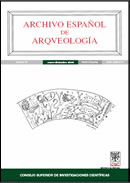
Archivo Espanol de Arqueologia
Discovering the past, shaping the future of archaeology.Archivo Español de Arqueología is a prestigious journal published by the Consejo Superior de Investigaciones Científicas (CSIC), dedicated to the field of archaeology and the historical sciences. Since its transition to Open Access in 1991, this journal has been a significant resource for scholars and practitioners in Spain and beyond, ensuring the dissemination of high-quality research to a broad audience. With an impressive Scopus ranking that places it within the top 20% of journals in the disciplines of History and Archaeology, Archivo Español de Arqueología plays a crucial role in advancing academic discourse and promoting innovative archaeological methodologies. The journal has maintained rigorous standards, reflected in its placement within the Q2 and Q3 quartiles, enabling it to establish a reputation for excellence and reliability in archaeological scholarship. Researchers, professionals, and students are encouraged to explore the journal's diverse array of articles from its foundation year of 2009 to the present, enriching their understanding of the past through the latest findings and theoretical advancements in archaeology.
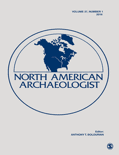
NORTH AMERICAN ARCHAEOLOGIST
Decoding the Layers of North American HistoryNORTH AMERICAN ARCHAEOLOGIST, published by SAGE PUBLICATIONS INC, is a prestigious journal that serves as an essential resource for professionals and scholars in the field of archaeology. With its ISSN 0197-6931 and E-ISSN 1541-3543, the journal aims to disseminate high-quality research that contributes to the understanding of the historical and cultural significance of North America from prehistory to the present. As of 2023, it holds an impressive Q2 category in Archaeology and ranks within the Q1 tier for Archaeology (arts and humanities), positioning it among the top journals in its field. Its Scopus rankings further emphasize its significance, reflecting a commendable percentile standing that underscores its influence in both arts and humanities and social sciences. The journal is committed to offering a platform for innovative research and scholarly discussion, making it invaluable for researchers, professionals, and students dedicated to advancing archaeological knowledge.
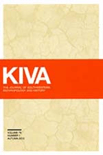
Kiva-Journal of Southwestern Anthropology and History
Fostering Scholarly Dialogue on Southwestern StudiesKiva - Journal of Southwestern Anthropology and History is a distinguished academic journal published by Routledge Journals, Taylor & Francis Ltd, that serves as a vital resource for scholars in the fields of anthropology, archaeology, and history. With an ISSN of 0023-1940 and an E-ISSN of 2051-6177, this journal has established itself as a significant avenue for scholarly communication since its inception in 1964. It consistently ranks in the top quartiles, including Q1 in Archaeology and Q2 in Anthropology, reflecting its high impact and rigorous peer-review process. Covering a wide array of topics pertinent to the Southwestern United States, Kiva invites original research articles, reviews, and methodological papers that advance understanding of the region's rich cultural heritage and historical narratives. While currently not open access, its commitment to disseminating quality research makes it an essential reading for researchers, professionals, and students aiming to explore the multifaceted dimensions of southwestern studies.
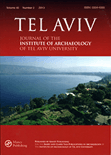
Tel Aviv-Journal of the Institute of Archaeology of Tel Aviv University
Exploring the Depths of Archaeological DiscoveryTel Aviv-Journal of the Institute of Archaeology of Tel Aviv University, published by Routledge Journals, Taylor & Francis Ltd, stands as a premier academic publication in the fields of archaeology, cultural studies, and history. Established in 1974, this journal has significantly contributed to archaeological scholarship and fosters a rich dialogue among researchers and practitioners worldwide, particularly in the context of the Middle East. With a remarkable Q1 ranking in multiple categories, including Archaeology and Cultural Studies, it is recognized for its high-quality, impactful research. The journal's audience consists of academics, professionals, and students eager to explore new findings and interdisciplinary approaches. While it does not operate under an open-access model, its scholarly articles are pivotal for advancing knowledge and understanding in archaeology and related fields, thus continuing its legacy as a vital resource for cutting-edge research up to 2024.
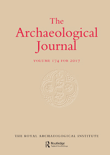
Archaeological Journal
Exploring Humanity's Heritage Through Rigorous ResearchArchaeological Journal, published by Taylor & Francis Ltd, stands as a leading voice in the field of archaeology, with a remarkable distinction in the Q1 category for both arts and humanities as well as conservation, underscoring its critical role in advancing scholarly dialogue and research. With an ISSN of 0066-5983 and E-ISSN of 2373-2288, this journal provides a platform for innovative research from 1977, now offering insights up to 2024. The United Kingdom-based journal is highly regarded, being within the top 81st percentile in archaeology and conservation according to Scopus rankings. Essential for researchers, professionals, and students, the journal's content spans rigorous archaeological studies, theoretical advancements, and discussions on conservation practices, ultimately aimed at fostering a deeper understanding of humanity's past. Notably, with no open access option, it maintains a traditional publishing approach, thereby ensuring curated and high-quality contributions to the academic community.

Conimbriga-Revista de Arqueologia
Connecting Researchers to the Rich Tapestry of HistoryConimbriga-Revista de Arqueologia is a distinguished open-access journal dedicated to the field of archaeology, published by COIMBRA UNIVERSITY PRESS. Since its inception, the journal has fostered a vibrant intellectual community focused on the exploration and dissemination of archaeological research, particularly emphasizing studies relevant to the rich historical and cultural heritage of Portugal and beyond. With its open access model established in 2014, it has become a vital resource for researchers, professionals, and students to share their findings without access barriers, encouraging collaboration and knowledge exchange. Despite the absence of specific metrics such as the HIndex and Scopus rankings, the journal is recognized for its commitment to high-quality scholarship and its role in advancing archaeological discourse. Positioned within the scholarly landscape, Conimbriga-Revista de Arqueologia serves as a crucial platform for the publication of innovative research, reviews, and critical essays, making it an essential journal for those invested in the archaeological sciences.

Southern African Humanities
Innovating scholarly discourse in the humanities.Southern African Humanities is an esteemed academic journal published by the Natal Museum, dedicated to advancing the fields of anthropology, archaeology, and cultural studies with a particular focus on the Southern African context. Since its inception in 2008, the journal has consistently provided a platform for innovative research and scholarly discourse, earning a prominent reputation with a 2023 impact factor that places it in the Q2 and Q1 quartiles across multiple relevant categories, including Anthropology, Archaeology, and History. The journal is recognized for its rigorous peer-review process and dissemination of high-caliber research, exemplified by its Scopus rankings, which reflect its widespread influence within the humanities. Although it does not currently offer open access options, the journal remains pivotal for researchers, professionals, and students aiming to deepen their understanding of Southern African cultures and historical contexts. Located in Pietermaritzburg, South Africa, Southern African Humanities continues to be an essential resource for those engaged in the humanities, enhancing knowledge and fostering research collaborations within the region and beyond.

ANTIQUITY
Unveiling the Past, Shaping the FutureANTIQUITY is a prestigious academic journal published by Cambridge University Press that has been at the forefront of archaeological and humanities scholarship since its inception in 1927. With its roots firmly planted in the United Kingdom, the journal has achieved remarkable recognition, maintaining a Q1 ranking in both the fields of Archaeology and Arts and Humanities as of 2023. With an impressive Scopus ranking of #3 out of 173 in General Arts and Humanities and #28 out of 354 in Archaeology, it underscores its significant impact and influence in shaping contemporary discourse in these domains. Although it is not an Open Access journal, ANTIQUITY provides crucial insights into the evolution of human societies through a comprehensive range of archaeological studies, reviews, and theoretical discussions. By facilitating knowledge exchange among researchers, professionals, and students, ANTIQUITY not only enriches academic literature but also fosters a deeper understanding of our past.
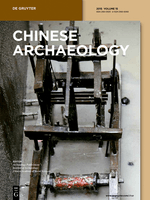
Chinese Archaeology
Deciphering the Mysteries of China's Archaeological LegacyChinese Archaeology, published by WALTER DE GRUYTER GMBH, is a leading journal dedicated to the exploration and study of China's rich archaeological heritage. With an ISSN of 2160-5025 and an E-ISSN of 2160-5068, this journal serves as an essential platform for scholars, researchers, and enthusiasts in the field of archaeology, offering a blend of original research articles, reviews, and critical essays that address both contemporary issues and historical narratives. While it currently operates under a conventional access model, making cutting-edge research available to a select audience, it plays a crucial role in advancing knowledge about China's archaeological sites, artifacts, and past civilizations. Given the increasing interest in Eastern archaeology and its significance in a global context, Chinese Archaeology is positioned as a pivotal resource for understanding and interpreting the complexities of China’s historical evolution. Researchers and academics are encouraged to contribute and engage with this vital field of study to foster greater insights and innovations.